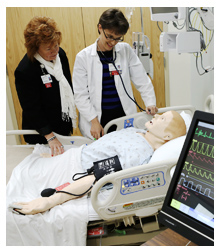UVMC Educational Simulators Enhance Patient Care
 Three new simulators replicating real life scenarios in babies through adults are bringing a new era of education to the Upper Valley Medical Center/Premier Health family.
Three new simulators replicating real life scenarios in babies through adults are bringing a new era of education to the Upper Valley Medical Center/Premier Health family.
The SimNewB, Sim Junior and Sim Man 3G simulators offer employees the opportunity to practice real life situations and real life skills in a safe environment, said Cindy Burke, RN,BSN, Clinical Educator at UVMC.
The patient simulators were a gift from the UVMC Foundation, said Jean Heath, UVMC Director of Nursing, Cancer Care Center/CardioPulmonary Rehab/Community Wellness/Education.
“We are most grateful to our Foundation. They really care about how we train our staff and educate our community. Their generosity in providing this technology will positively impact patient care,” Heath said.
The foundation purchased not only the baby, child and adult simulators but also a camera system. The system allows simultaneous broadcast or recording of training and other education projects across the Premier Health network which includes Miami Valley Hospital/Miami Valley Hospital South and Good Samaritan Hospital (closed in 2018) in Dayton and Atrium Medical Center in Warren County in addition to UVMC.
Burke used the word “amazing” to describe the simulators and the important educational opportunities they offer.
“We can actually do chest compressions on the simulators, validate the accuracy of the compressions and give feedback so we can improve the way we provide care,” Burke said. “These simulators are really great because you can practice skills that you don’t have a chance to practice frequently.”
For example, the simulators can be programmed to produce different heart and lungs sounds that a care provider might go years without hearing.
“We can replicate almost anything. We can change pupil size and even talk through the simulator,” said Burke, who worked with the simulator company and peers in the Premier system. Having simulators across the realm of life is valuable, Burke said because there is a big difference between caring for a child and an adult, and many children are seen in the Emergency Department.
The simulators are primarily put to use in the UVMC “simulation room” where scenarios can be developed and staff members practice an array of patient checks and procedures. The sessions can be watched via one-way mirror and simulcast or taped for individual review/training and group training. The simulation room replicates a patient room with the same type of bed and equipment found upstairs in the hospital.
Burke can control the simulator out of the view of staff so they are totally engaged in watching/working with the “patient.” The adult is controlled by a laptop computer while the baby and child by an iPad-like device.
“You can prebuild scenarios or develop them as you go. If you see an area where the staff is struggling, you can focus on that area,” Burke said.
The simulators physiologically respond. “If the blood pressure is too low, you will no longer get a pulse. It will respond as a patient would,” Burke said. The simulator also has a computer chip that recognizes the medication staff is giving and has the “patient’ react accordingly. If the response is not appropriate, the simulator can die.
The simulators are not just for nurses. They can be used by respiratory therapists for intubation practice and offer options for physician training, too.
The simulators are mobile. They will be making trips to patient floors for drills and later will be taken into the community for education, Heath said.
“It is just amazing how this is going to improve patient care and help us to continually raise the bar. We provide exceptional care but are continually working to do better and better,” Burke said.
“Anybody will agree that the more you practice something, the more comfortable you are. You want to increase the comfort level of staff. Who benefits from that? The patients will get higher quality of care,” she said.
Future plans include using the simulators to reach out with educational opportunities into the community. “The simulators are mobile enough that we could take them to colleges, community centers and train people for mock codes and other situations,” Heath said.
Contact Us
Discover more about Premier Health and join us in building healthier communities in Southwest Ohio. Learn more about working at Premier Health, becoming a volunteer, and making a gift to support our mission.

